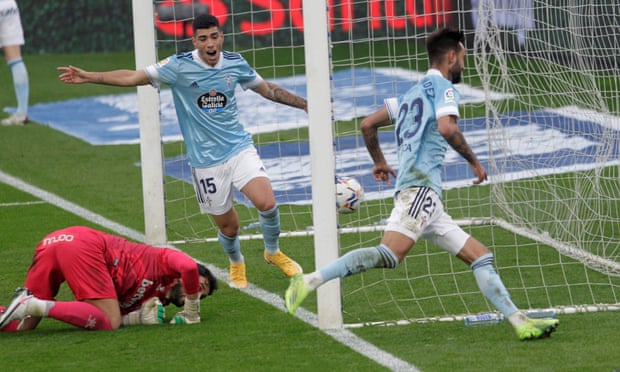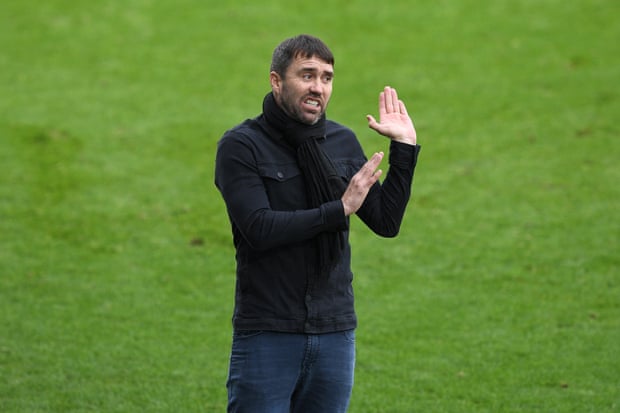'Chacho man' makes Celta the most fun team to watch in Spain now
Since Eduardo Coudet took over, no one in La Liga has won more, scored more or conceded fewer. It is a new dawn
(Reblogged from The Guardian)
Eduardo Coudet was pissed off, getting angrier and more drunk by the minute. That Rosario Central had been beaten 4-0 in the first leg of the Copa Conmebol final was bad enough, but it was past two in the morning and he was still stuck inside an empty stadium, unable to escape the humiliation, left with nothing to do but dwell on it. That and drink. His name came up with Pablo Sánchez, sent to the anti-doping room together. But however hard they tried, however much beer they downed – and it was a lot – they couldn’t provide a sample. Time passed and Coudet got increasingly agitated: he was going to have them.
This wasn’t the place and certainly wasn’t the time so Sánchez tried to calm him down. Let’s make a promise, he said: if we turn this round, we’ll spend the night inside the ground, our ground. Incredibly, Rosario won the second leg 4-0, claiming their first international trophy on penalties. And, as the players celebrated in the dressing room, preparing to hit the town, Sánchez reminded Coudet they had a promise to fulfil. He went home and came back with a pizza, a torch and a radio. Together they sat in the centre circle wondering why they hadn’t thought up a better promise than this and waiting for the sun to rise, which it always does.
Just ask fans of Real Club Celta de Vigo. Twenty-five years on, the day Eduardo “Chacho” Coudet first sat on the bench as their sixth new manager in three years they were the worst team in La Liga, bottom having won one game in 10. Since then, they are the best. Since Coudet took over, no one in Spain has won more, scored more or conceded fewer. Sunday’s 2-0 win over Alavés took Celta to four consecutive wins – every game he’s been there pitchside – and two points off Europe, a new dawn to rival anything in Rosario.
Chacho was a box-to-box midfielder who played for 10 clubs across 15 different spells, ending with the Philadelphia Union, where fans sang their own version of The Village People’s Macho Man, and the Fort Lauderdale Strikers. He won five titles with River and that 1995 Conmebol Cup. He also played nine games with Celta in 2002 when, as one local newspaper put it, “he left behind lots of strange haircuts and not much football”. Or as he put it on Cadena Ser radio: “I was close to the ball sometimes but I didn’t get to kick it very often. I hope to do a lot better here as a coach than as a player.”
He’s done that already and he’s only been here a month, the turnaround as immediate as it was unexpected. Not least because most didn’t expect anything. If Coudet was supposed to be good – he won the league with Racing Avellaneda and was top when he walked out on Internacional Porto Alegre to come to Spain – that wasn’t Europe and he wasn’t supposed to be this good this fast. “Chachismo is becoming a religion,” AS said, only there’s tangible proof of this.
Four months after giving him a new contract, Celta had sacked Oscar García following a draw with Elche. They had scored just six in nine games. Chacho took training but sat in the stands as Celta were beaten 4-2 by Sevilla, his paperwork still not cleared. Since then, with him officially in charge, they have played five and won them all: they beat Granada 3-1, Athletic 2-0, Cádiz 4-0 and Alavés 2-0. They also beat Llanera 5-0 in the cup; 16 scored, one conceded in five matches, 11-1 in the league. No one in Spain has a record as good in that time. The team that had scored six and won one in nine league matches under Óscar have got twice as many goals and four times as many wins in half the time.
“The suffering takes years off you but when you win it feels special,” Iago Aspas said the night they beat Granada. “When a coach goes, it’s always the players’ fault as well. You have that thorn in your side. But we’re finding our level again. We’re still down there, but we’re lifting our heads up. There’s been a reaction. The manager? He’s very energetic, likes to press very high, and likes to have a lot of players with good feet behind the forward.”
There is a video of a game where fans are shouting “pecho frío” – cold heart, someone who doesn’t care – at Chacho. “A cuck, maybe,” he replies, laughing, “but not a pecho frío, no. Never. Not that.” Teammates recall wild practical jokes – one involves a full hazmat suit – a lot of noise, and even more energy and that character doesn’t change. He is temperamental, to use his own word. More open, more charismatic and more direct, genuinely funny Chacho has already become closer to Celta’s players than Óscar was.
There is an idea too and it is non-negotiable. It is the same here as it was in Argentina and Brazil and it is very, very attacking. Just about the first thing Coudet told his players was that they had to go for it: let go and he would take responsibility if it went wrong. That was familiar: Benfica’s Franco Cervi will recall him shouting from the touchline at Rosario: “Take him on, take him on! If it goes wrong, no worries: blame me!” It was also welcome: the pressure was becoming overwhelming and, besides, footballers still prefer to play football. Doing so requires a leap of faith, though. And results.
“Make no mistake: the message is play good football and to play good football you need balls,” he says. “Balls isn’t throwing yourself about, it’s wanting the ball, playing it, combining with teammates.”
Celta have the players to do so – “good feet” as Aspas put it – and everyone knew that already but while Chacho’s diagnosis is not so different, the treatment is. Óscar sought organisation, to protect his team and minimise their weaknesses. He wanted them to sit deeper and bring the ball from the back. Chacho has gone the other way, trying to make more of their strengths, pressing from the front. And so far, pulling everyone up the pitch bar the central defenders and Tapia, the sitting midfielder, making the pitch longer, has been beneficial defensively too: 335 minutes they have gone without conceding. Meanwhile, they’re running at 2.6 goals a game compared to 0.6 before.
Playing in a sort of 4-1-3-2, with both full-backs covering the entire wing, Celta press relentlessly. The number of interceptions is higher; where they happen is too. If the first wave doesn’t win the ball, a tactical foul tends to follow. For all the apparent freedom, there is a structure, an order to it all. There are demands too. The intensity is hard to maintain – one player admits that when he gets home he can barely walk and just wants to sleep – but it is necessary and they’re enjoying it. So is everyone watching. Probably no one is as much fun as Celta now. “It’s not a momentary effort; it’s an idea and the fans will identify with us if we play like this,” Chacho says. “If we take our foot of the accelerator, we’ll suffer for sure,” Nolito says.
The attacking five – usually Denis Suárez and then Nolito, Brais Méndez, Aspas and Santi Mina – are fluid, moving all over the place, with full-backs Lucas Olaza and Hugo Mallo going beyond them to either side.
At its heart is Aspas, arguably the best Spanish footballer there is, playing with freedom, a man of whom Coudet says: “Everything he does makes something happen: not just goals and assists, but everything.” Everyone is benefitting, all of them are playing a part. Against Granada Nolito, Miguel Baeza and Fran Beltrán scored; against Athletic it was Mallo and Aspas; against Cádiz, Nolito, Aspas, Beltrán and Brais. This weekend, in a game that was far from easy, where the second half changes were defensive, seeking to protect a lead taken early and where the second didn’t arrive until 10 minutes from the end, Brais got both. It had taken him 59 games to get two goals; now he has three in two games, two in an hour.
Asked what Celta’s ceiling is, Coudet replied: “There is no ceiling.” But, he warned: “Lose two games and you’re in trouble again, so you don’t ever look back.” It was hard not to, though, if only to see how far they had come in such a short time. Sure, it’s only four games, but to put that in context: Celta hadn’t been on a run this good for six and a half years. You could understand them getting excited, whatever comes next. “Coudet performs magic,” El Faro de Vigo cheered. There was, Marca’s headline read, “a party at Balaídos”, even though there was no one there. Just like that night in Rosario.
No copyright infringement intended. For educational, non-commercial purposes only.



No comments:
Post a Comment
Note: Only a member of this blog may post a comment.